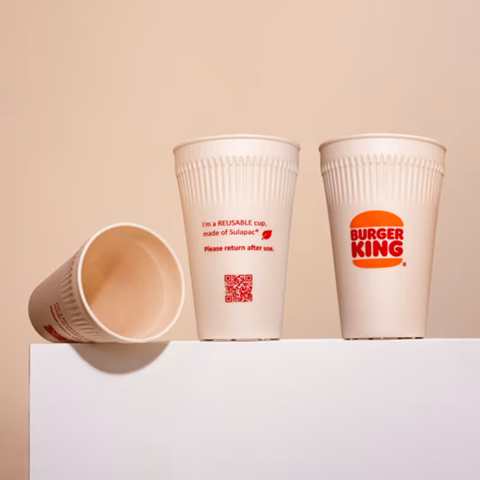
Biochemistry company TripleW has partnered with Sulapac on a closed-loop pilot, demonstrating that reusable cups made from Sulapac Solid – a ‘100% bio-based and biodegradable’ material – can be chemically recycled commercially.
The companies state that the upcycling system eliminates the need for fossil-based materials, delivers long-term cost savings and aligns with the European Union’s circularity goals.
According to Sulapac, its dishwasher-proof Sulapac Solid material combines a ceramic-like appearance with ‘exceptional’ durability. Compatible with standard plastic production processes and designed for repeated use in environments such as airplanes, cruise ships, and quick-service restaurants, Sulapac Solid aims to offer a sustainable alternative to oil-based plastics at scale.
In the pilot, used Sulapac Solid cups were collected, grinded and broken down via hydrolysis into their building blocks, including lactic acid. This polymer-to-polymer recycling process ensures the material can be reused repeatedly, eliminating waste and quality degradation.
Last month, Appleyard Lees reported that chemical recycling for plastics has reached an ‘all-time peak’, with the number of organizations filing patents said to have more than tripled over five years. Of all the plastic types, 297 patents concerned polypropylene – typically in food packaging applications – followed by 288 for PET and 277 for PVC.
Also in October, reusable packaging provider r.World claims its reverse logistics and sanitizing solutions have kept 20 million single-use cups and foodware items out of landfills, and avoided the production of over 110 tons of plastics. Customers can create an r.World account and order the necessary size and quantity of reusable cups and serveware for their event via the r.Turn app.
If you liked this story, you might also enjoy:
The ultimate guide to the Packaging and Packaging Waste Regulation in 2025
How are the top brands progressing on packaging sustainability?
Everything you need to know about global packaging sustainability regulation in 2025
The key to increasing the use of reusable packaging in supermarkets













No comments yet